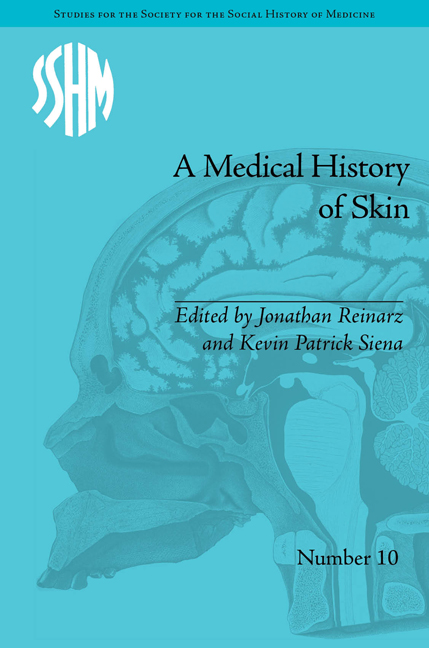Book contents
- Frontmatter
- CONTENTS
- List of Contributors
- List of Figures and Tables
- Scratching the Surface: An Introduction
- Part I The Emerging Skin Field
- 1 Drain, Blister, Bleed: Surgeons Open and Close the Skin in Georgian London
- 2 Abominable Ulcers, Open Pores and a New Tissue: Transforming the Skin in the Norwegian Countryside, 1750–1850
- 3 Protecting the Skin of the British Empire: St Paul's Bay Disease in Quebec
- 4 ‘Italic Scurvy’, ‘Pellarina’, ‘Pellagra’: Medical Reactions to a New Disease in Italy, 1770–1815
- Part II Skin, Stigma and Identity
- Part III Skin, Disease and Visual Culture
- Afterword: Reading the Skin, Discerning the Landscape: A Geo-historical Perspective of our Human Surface
- Notes
- Index
3 - Protecting the Skin of the British Empire: St Paul's Bay Disease in Quebec
from Part I - The Emerging Skin Field
- Frontmatter
- CONTENTS
- List of Contributors
- List of Figures and Tables
- Scratching the Surface: An Introduction
- Part I The Emerging Skin Field
- 1 Drain, Blister, Bleed: Surgeons Open and Close the Skin in Georgian London
- 2 Abominable Ulcers, Open Pores and a New Tissue: Transforming the Skin in the Norwegian Countryside, 1750–1850
- 3 Protecting the Skin of the British Empire: St Paul's Bay Disease in Quebec
- 4 ‘Italic Scurvy’, ‘Pellarina’, ‘Pellagra’: Medical Reactions to a New Disease in Italy, 1770–1815
- Part II Skin, Stigma and Identity
- Part III Skin, Disease and Visual Culture
- Afterword: Reading the Skin, Discerning the Landscape: A Geo-historical Perspective of our Human Surface
- Notes
- Index
Summary
St Paul's Bay disease was a greatly feared infectious illness in late eighteenth-century Quebec. From 1775 to 1790 it was a health problem of major proportions in dozens of parishes in Quebec – one that appeared to be both endemic and epidemic in nature. Considered by contemporaries (and by more recent medical historians) as a form of non-venereal syphilis, or perhaps another of the treponematoses (pinta/yaws), St Paul's Bay disease was prominent throughout the colony, affecting thousands of colonists directly and indirectly. By 1785 it had created enough concern to elicit an ambitious response that brought to bear the combined energies of the British colonial government, the Catholic clergy and the medical profession upon the physically unwell peasantry of Quebec. Leading the medical charge was the physician James Bowman, who was instructed by Governor Henry Hamilton to create an effective plan for the eradication of the disease.
The widespread nature of the disease (its epidemiological scope), its prominent skin-deep manifestations and its geo-imperial context explain much about how it was identified, approached and negotiated by various social groupings in late eighteenth-century Quebec. British colonial authorities understood the vulnerability of French colonists to this disease in much the same way as they understood the precarious position of their newly acquired French colony, situated as it was beside a North American population to the south that was increasingly hostile to British interests. The geopolitical context of North American imperialism, marked by the British conquest of Quebec in 1760 and the American Revolutionary War twenty years later (1775–83), directly influenced the meaning of St Paul's Bay disease.
- Type
- Chapter
- Information
- A Medical History of SkinScratching the Surface, pp. 43 - 56Publisher: Pickering & ChattoFirst published in: 2014



